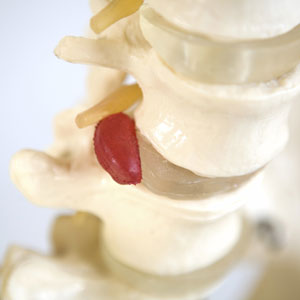Disc Herniation Care in Barrie
Understanding Disc Herniations
 A disc herniation, also commonly referred to as a “slipped disc,” occurs when a tear in the disc’s tough outer layer allows the soft jelly-like interior to push out, pressing on the nerve roots as they leave the spinal canal. Disc herniations can occur at any of the discs between the vertebrae of the spine, but they’re most common in the lower neck and lower back.
A disc herniation, also commonly referred to as a “slipped disc,” occurs when a tear in the disc’s tough outer layer allows the soft jelly-like interior to push out, pressing on the nerve roots as they leave the spinal canal. Disc herniations can occur at any of the discs between the vertebrae of the spine, but they’re most common in the lower neck and lower back.
What Causes Disc Herniations?
Disc herniations can occur for many reasons, including:
- Age: The natural aging process can lead to wear and tear on the discs, making them more likely to herniate.
- Trauma: A sudden injury, such as a fall, car accident, or improper lifting form can cause disc herniations.
- Poor Posture: Chronic poor posture, especially when sitting for extended periods, can strain the spine and increase the risk of herniations.
- Repetitive Movements: Jobs or activities that involve repetitive bending, lifting, or twisting can contribute to disc issues.
- Genetics: Some people may be genetically predisposed to disc problems.
More Common Than You Think
Recognizing the Symptoms
Disc herniations are very common and often asymptomatic. This is because a normal healthy disc does not have any nerves that can detect the damage as it happens. A disc herniation may become symptomatic when the herniation begins to push on surrounding structures, such as nerves or muscles, or if a local inflammatory response is triggered in the area.
The symptoms of a disc herniation vary depending on the location and severity of the herniation. Common signs include:
- Pain at the site of herniation (typically back or neck)
- Radiating pain into the arms or legs
- Numbness and tingling
- Muscle weakness
- Difficulty walking or maintaining balance
Our Comprehensive Approach to Care
Our team has expertise in addressing disc herniations. With proper diagnosis, we can craft a plan to help address the root cause of the pain. The approach will be individualized to your specific case, and may include:
- Spinal Adjustments: Chiropractic care uses gentle, targeted adjustments to mobilize the spine and relax the surrounding muscles, reducing pressure on the affected disc and promoting natural healing.
- Pain Management: Your practitioner can help reduce pain and inflammation associated with disc herniations, allowing you to regain your mobility and improve your quality of life.
- Rehabilitation: Your practitioner may recommend exercises and stretches to strengthen the muscles supporting the spine, preventing future injury and helping your body heal naturally.
- Lifestyle Advice: Our chiropractors provide guidance on maintaining proper posture and making ergonomic adjustments to minimize the risk of recurrent disc herniations.
Hope for Recovery
Many patients with disc herniations experience significant improvement with proper care. Our approach focuses not just on relieving your immediate pain, but on addressing the underlying causes and preventing future issues.
Ready to Find Relief?
If you suffer from disc pain, our experienced chiropractors and caring team at Complete Care Chiropractic are here to help. We understand how debilitating back and neck pain can be, and we’re committed to helping you regain your mobility and return to the activities you love.
We’re currently accepting new patients and would be honored to be part of your healing journey. Call Complete Care Chiropractic today to book an appointment and take the first step toward a pain-free life!

